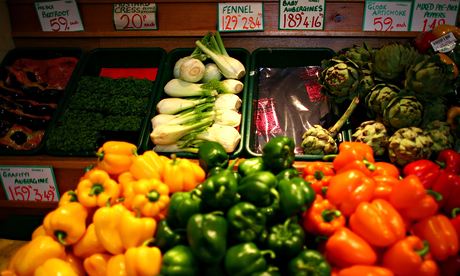I was somewhat amused at
the news reports last week that eating more fruit and vegetables “would reduce
the risk of death”. Somehow I think the
risk is still 100% certainty, and it won’t go down to 99.99% no matter how much
fruit and veg you eat!
As Benjamin
Franklin observed: "In this world nothing can be said to be certain, except
death and taxes". But what of the other
world, the Kingdom over which Jesus presides?
What does this week’s gospel reading, the death and rising of life of Jesus’
friend Lazarus have to do with us?
 |
| Eating at least seven portions of fresh fruit and vegetables a day was linked to a 42% lower risk of death from all causes. Photograph: Jeff J Mitchell/Getty Images |
The thing that most
struck me is that Lazarus death and “reawakening” doesn’t seem to be as a
result of Jesus’ love for his friend but for bringing glory to God. I would like to think that Jesus hugged his
newly-restored friend Lazarus at some point, but we are not told this. Of course, Lazarus would die again - if I was Lazarus, I might have
been a bit disappointed that I had awoken to the same life as before, rather
than the eternal life that is promised.
Indeed, this whole episode wasn’t really for his benefit at all. I’m sure he wasn’t ungrateful for his new lease
of life, as people who have faced death often seem to have a greater capacity
not to waste their remaining time – perhaps he even enjoyed being a local
celebrity that the bigwigs from Jerusalem came to see so that he could testify
what Jesus had done for him.
But Lazarus was not the
main player in this drama. Instead, this
all happened as Jesus had originally said: “This
sickness will not end in death. No, it is for God’s glory so that God’s Son may
be glorified through it.” Jesus knew
that Lazarus would die but it would not be a definitive death. It was to reveal God’s glory in his Son.
If Lazarus' resurrection
reveals God’s glory in Christ Jesus, then our resurrection will too. Whilst I’m sure that God’s offer of salvation
is motivated by love (because it says so in John 3:16), have you ever considered
that God might want to give you a resurrection body and eternal life because it
rewards our faith by glorifying his Son?
In the same way as the original creation was good, maybe our re-creation
is as pleasing to God, if not more so.
If we doubt that we are worthy of eternal life, then consider that God
wants to do it anyway for his own joy and pleasure as a response to our faith
in Jesus. Your resurrection, my
resurrection, the resurrection of the person who may come to him through our
witness, all these resurrections will delight the Father because in doing so
his Son is glorified.
Jesus doesn’t want us to
have a vague hope for eternal life, perhaps as a disembodied soul or
ghost. Even though we all die, Jesus
tells us that this is not the end. We
don’t know the nature of Lazarus’ life-threatening condition, but whatever it
was, Jesus can say, “This sickness will
not end in death.” So, it is with
whatever conditions threaten us: “This cancer will not end in death”; “this
heart attack will not end in death.”
Whatever it will say as the cause of death on our death certificate,
Jesus’ response is to tear it up and say, “This will not end in death”.
Instead, he says: “I am the resurrection and the life. The one
who believes in me will live, even though they die; and whoever lives by
believing in me will never die.” As
he asked Martha, so he asks us: “Do you
believe this?” and, if we still need further motivation: “Did I not tell you that if you believe,
you will see the glory of God?” Being selfish, eternal life has always been immensely attractive, but to know that my resurrection will glorify Jesus seems like a stronger reason for God to make it happen!